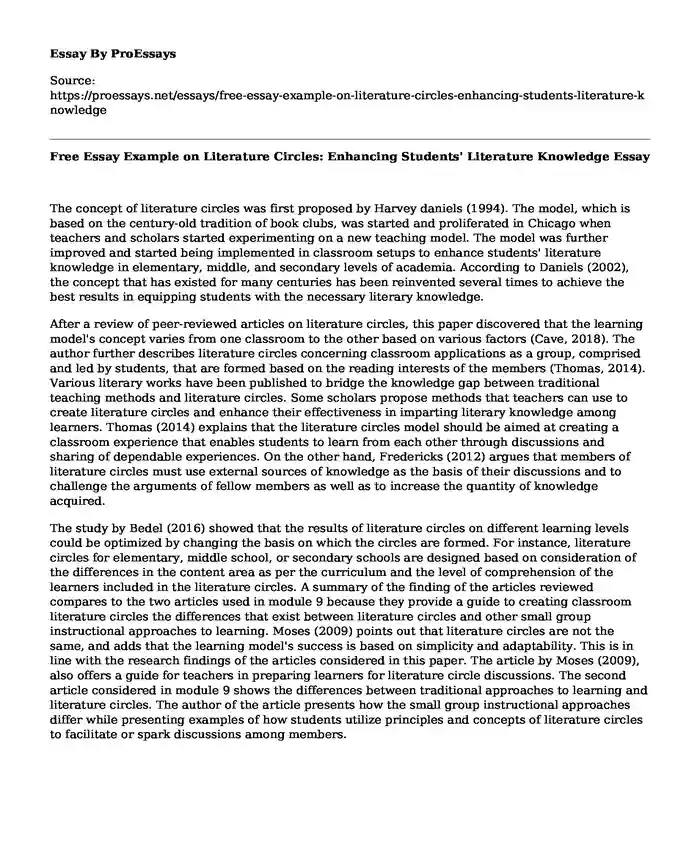The concept of literature circles was first proposed by Harvey daniels (1994). The model, which is based on the century-old tradition of book clubs, was started and proliferated in Chicago when teachers and scholars started experimenting on a new teaching model. The model was further improved and started being implemented in classroom setups to enhance students' literature knowledge in elementary, middle, and secondary levels of academia. According to Daniels (2002), the concept that has existed for many centuries has been reinvented several times to achieve the best results in equipping students with the necessary literary knowledge.
After a review of peer-reviewed articles on literature circles, this paper discovered that the learning model's concept varies from one classroom to the other based on various factors (Cave, 2018). The author further describes literature circles concerning classroom applications as a group, comprised and led by students, that are formed based on the reading interests of the members (Thomas, 2014). Various literary works have been published to bridge the knowledge gap between traditional teaching methods and literature circles. Some scholars propose methods that teachers can use to create literature circles and enhance their effectiveness in imparting literary knowledge among learners. Thomas (2014) explains that the literature circles model should be aimed at creating a classroom experience that enables students to learn from each other through discussions and sharing of dependable experiences. On the other hand, Fredericks (2012) argues that members of literature circles must use external sources of knowledge as the basis of their discussions and to challenge the arguments of fellow members as well as to increase the quantity of knowledge acquired.
The study by Bedel (2016) showed that the results of literature circles on different learning levels could be optimized by changing the basis on which the circles are formed. For instance, literature circles for elementary, middle school, or secondary schools are designed based on consideration of the differences in the content area as per the curriculum and the level of comprehension of the learners included in the literature circles. A summary of the finding of the articles reviewed compares to the two articles used in module 9 because they provide a guide to creating classroom literature circles the differences that exist between literature circles and other small group instructional approaches to learning. Moses (2009) points out that literature circles are not the same, and adds that the learning model's success is based on simplicity and adaptability. This is in line with the research findings of the articles considered in this paper. The article by Moses (2009), also offers a guide for teachers in preparing learners for literature circle discussions. The second article considered in module 9 shows the differences between traditional approaches to learning and literature circles. The author of the article presents how the small group instructional approaches differ while presenting examples of how students utilize principles and concepts of literature circles to facilitate or spark discussions among members.
Conclusion
To implement a literature circle model in elementary school, as a teacher I will have to adopt an approach that fosters collaboration among students, allows them to choose books which they prefer for their study, provides them with an opportunity voice their opinions, and provides them with an opportunity to have fun. This will help instill a sense of self-management as fellow students will manage the circles. The literary works selected for discussion in the circles will consider the learners' comprehension level and their relevance to the rest of the learning materials.
References
Bedel, O. (2016). Collaborative learning through literature circles in EFL. European Journal of Language and Literature, 2(3), 96-99. http://journals.euser.org/index.php/ejls/article/view/636
Cave, C. (2018). Benefits of Online Literature Circles in the College Arena. The Journal of Global Business Management, 14(2), 47-56. http://www.jgbm.org/page/6%20Chessica%20Cave.pdf
Daniels, H. (2002). Literature circles: Voice and choice in book clubs and reading groups. Stenhouse Publishers. https://books.google.com/books?hl=en&lr=&id=hsIUp1-k5-8C&oi=fnd&pg=PR7&dq=Daniels,+H.+(2002).+Literature+circles:+Voice+and+choice+in+book+clubs+and+reading+groups.+Stenhouse+Publishers.++&ots=Q2pI86JzsB&sig=fZGcdt_lMj1gTQYZGtNn33ETTf8
Fredericks, L. (2012). The Benefits and Challenges of Culturally Responsive EFL Critical Literature Circles. Journal of Adolescent & Adult Literacy, 55(6), 494-504. DOI:10.1002 https://ila.onlinelibrary.wiley.com/doi/abs/10.1002/JAAL.00059
Literature circles. Education.vic.gov.au. (2020). https://www.education.vic.gov.au/school/teachers/teachingresources/discipline/english/literacy/readingviewing/Pages/teachingpraccircles.aspx.
Moses, A. (2020). How to Create a Classroom Literature Circle. Edutopia. https://www.edutopia.org/literature-circles-classroom-book-discussion-how-to.
Thomas, A. (2014). An action research study involving motivating middle school learning through online literature circles. Journal of Ethnographic & Qualitative Research, 9(1). http://search.ebscohost.com/login.aspx?direct=true&profile=ehost&scope=site&authtype=crawler&jrnl=19353308&AN=101749379&h=giQkb9Q9phYLxbNlR8VvAfgX%2BBn%2FUsN6Bmug9RdWCXSA7rxoN2zTbvE8CcPebq9%2B2eHhR%2FfdWRx68%2B%2F2QWkWlQ%3D%3D&crl=c
Cite this page
Free Essay Example on Literature Circles: Enhancing Students' Literature Knowledge. (2023, Oct 22). Retrieved from https://proessays.net/essays/free-essay-example-on-literature-circles-enhancing-students-literature-knowledge
If you are the original author of this essay and no longer wish to have it published on the ProEssays website, please click below to request its removal:
- Fire and Ice: Symbolism in the Poetry of Robert Frost Essay
- Essay Sample on Development of History Through Writings
- Compare and Contrast Essay on Two Kinds, Perfect Strangers, and Harrison Bergeron
- Essay Example on The Marrow Thieves and Its Depiction of Indigenous Resilience
- Essay Example on ACE Score & Its Impact on Future Mental & Physical Health
- Essay Sample on Gamification: Enhancing Learning with Fun and Excitement
- Grandma's Delicious Recipes: My Baking Journey with My Grandmother - Paper Sample







